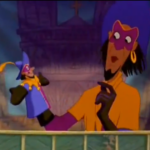The highly anticipated film ‘Pinocchio’, released on September 8, 2022, in the United States, captures the imagination of both children and adults. Directed by Robert Zemeckis, this adaptation features a stellar cast including Tom Hanks as Geppetto, Benjamin Evan Ainsworth as Pinocchio, and Joseph Gordon-Levitt as Jiminy Cricket.
Yet, amidst the enchanting animation and heartwarming moments, the character of the Coachman stands out for his insidious dishonesty.
This blog post explores nine dishonest qualities of the Coachman that are often ignored, shedding light on his manipulative traits that serve as cautionary lessons.
1. The Coachman’s Deceptive Promises of Fun and Freedom
The Coachman lures innocent boys to Pleasure Island with the false promise of unlimited fun and freedom. He tantalizingly declares, “Here, boys can do anything they want!” While this sounds appealing, it is a deceptive tactic designed to ensnare them. The Coachman’s dishonesty lies in his failure to disclose the dire consequences of unchecked freedom.
2. Exploiting Childhood Innocence
The Coachman exemplifies the exploitation of childhood innocence. He preys on the desires of young boys who crave adventure. By understanding their naivety, he cunningly manipulates them into abandoning their morals. This awareness of children’s vulnerabilities showcases a deeply dishonest quality that should not be ignored.
3. Evasion of Responsibility
One of the most alarming traits of the Coachman is his refusal to take responsibility for the chaos he creates. When the boys suffer the consequences of his manipulation, he conveniently blames them for their choices. This lack of accountability reflects a crucial dishonest quality and serves as a cautionary reminder of the importance of owning one’s actions.
4. The Coachman’s Inconsistent Messaging
Inconsistent messaging is another key aspect of the Coachman’s dishonesty. While he promises adventure and joy, the reality is far from it—children are transformed into donkeys. This stark contrast illustrates how misleading promises can lead to tragic outcomes, reminding audiences to be wary of those who say one thing while meaning another.
5. The Use of Fear to Control
The Coachman employs fear as a tool for manipulation. By creating an atmosphere of excitement tied to the unknown, he controls the boys’ emotions and decisions. This tactic serves as a powerful yet dishonest means of drawing them deeper into his trap.
6. Dehumanization of Victims
The Coachman’s treatment of the boys once they become donkeys is another dishonest quality that reflects his complete disregard for their humanity. He views them merely as commodities to profit from, which underscores a moral bankruptcy that is detrimental to society as a whole.
7. Encouraging Disobedience
Surprisingly, the Coachman promotes disobedience as a form of freedom. By encouraging children to abandon their responsibilities, he perpetuates a cycle of negativity and mischief. His push for rebellion against societal norms is a dishonest reflection of the value of personal integrity.
8. Playing the Victim
When confronted, the Coachman often plays the victim, manipulating situations to gain sympathy. This tactic is deceptively dishonest, diverting attention away from his wrongdoings and allowing him to escape accountability for his actions. As he misrepresents himself, viewers learn a valuable lesson about recognizing true intentions.
9. A Lack of Empathy
Finally, the Coachman exhibits a profound lack of empathy toward his victims. His selfish motivations blind him to the misery and suffering he inflicts on innocent boys. This particular quality of dishonesty showcases the broader implications of what occurs when individuals prioritize their desires over the well-being of others.
In conclusion, the Coachman in ‘Pinocchio’ serves as a stark reminder of the dangers of dishonesty. His nine deceptive qualities—ranging from exploiting childhood innocence to lacking empathy—highlight important moral lessons.
While his actions may seem entertaining in a fictional context, they resonate strongly as warnings against manipulation and deceit in real life.
As viewers immerse themselves in the enchanting world of ‘Pinocchio’, it’s crucial to remember the implications of the Coachman’s dishonest traits and the valuable lessons they impart about morality, integrity, and trust.










